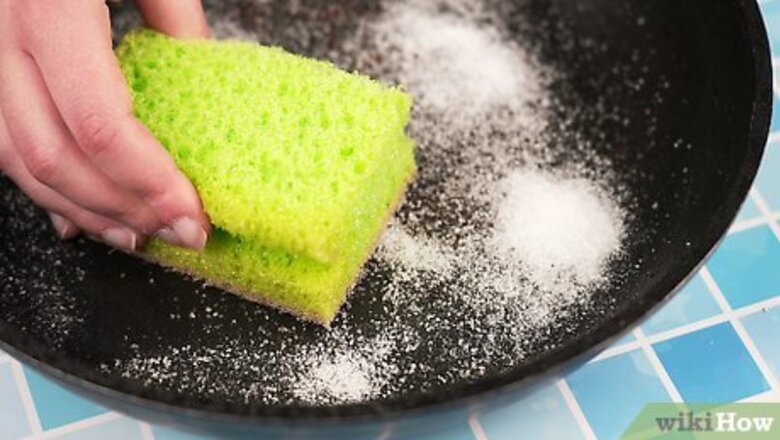
views
Scrub grimy cookware with salt.
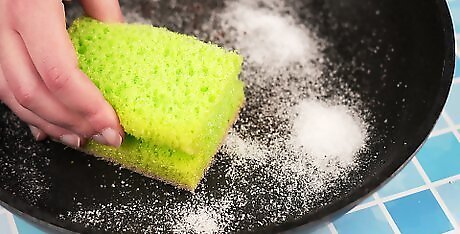
Salt might not look rough, but it's actually quite abrasive. If you've got grimy or greasy cookware, sprinkle enough salt to lightly cover the bottom of your pan. Then, take a damp scrub brush or sponge and scour the pan. Rinse the salt off and wash your pan with hot, soapy water to completely clean it. Although salt is great for cleaning pans like cast iron skillets, don't use it on non-stick surfaces or you could destroy the coating.
Make an all-purpose kitchen cleaner.
Mix equal parts salt and vinegar in a bowl and pour it into a spray bottle. Shake the bottle really well before you spray the cleaner on counters, tables, or surfaces in your kitchen or bathroom. Once you spritz the cleanser on, rub it off with a damp sponge. Rinse out your sponge and wipe again to remove the cleanser. Vinegar is a weak acid, so it's really helpful in a cleaning product. It can lift dirt and stains, especially when you combine it with salt. If you have stuck on messes, go ahead and sprinkle salt directly onto a damp sponge. Then, scour the surface until it's clean. This is great for cleaning tile or grout, for instance.
Get rid of rust on your cookware and knives.
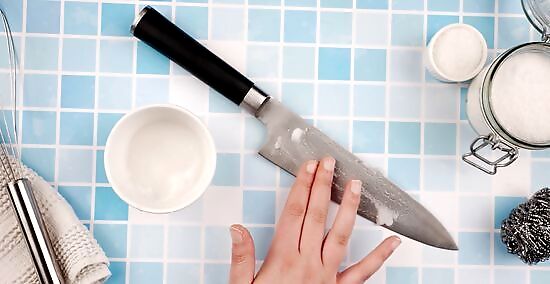
Mix equal parts water, salt, and cream of tartar to make a thick paste. Carefully spread the paste on the rusty metal and let it dry completely. Then, take a kitchen brush and scrub off the dried paste. Rinse the metal and wipe the shiny surface dry so you don't see water spots. For an even brighter result, use lemon juice instead of water when you mix the paste.
Clean up messy oven spills with salt.
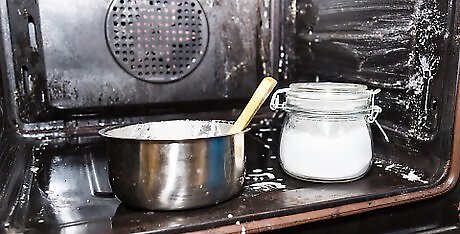
Pour salt on spills while the oven's still warm and let it sit. The salt will actually make it easier to scrape up bubbly, gooey messes from the floor of the oven. Once the oven's cool, take a sturdy plastic scraper and scrape off the hardened salty mess. Then, you can go back with a scrub brush dipped in hot soapy water and clean the surface. If you don't have time to clean up the oven while it's still warm, it's totally fine! Just spray water on the dried mess. Then, sprinkle salt all over it before you start scraping.
Polish copper or brass with a salt paste.
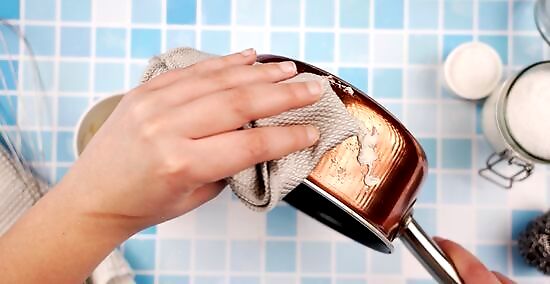
Combine equal parts flour, vinegar, and salt into a thick paste. You can use your fingers or a dry cloth to spread the paste onto tarnished copper or brass. Let it sit for 1 hour before you wipe off the paste with a clean, damp cloth. You should see shiny metal underneath. Unsure if your piece is brass or bronze? No worries! You can use this polishing paste for both.
Scrub cutting boards with salt and lemon.
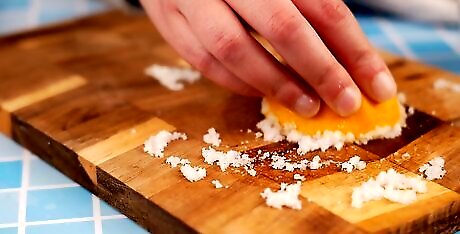
Get rid of odors by rubbing half a lemon dipped in coarse salt across the board. The citrus juice will work with the abrasive salt to fresh the board. This is really useful if you've just cut something smelly like onions or garlic on the board. Rinse the board with cold water and dry it thoroughly before you store it. Keep in mind that salt and lemon won't sanitize the board so you'll still need to wash it with hot, soapy water if you've cut raw meat or seafood on it.
Keep the drains in your sinks clear.
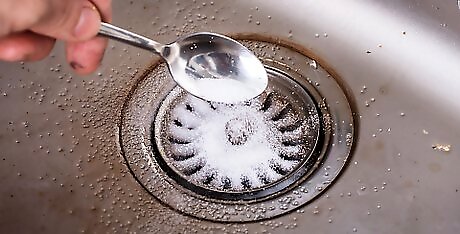
Pour salt, vinegar, and baking soda down your drains to destroy soap scum. Don't wait for your sink to clog before you clean it! Once a month, pour 1 cup (273 g) of salt, 1 cup (230 g) of baking soda, and ⁄2 cup (120 ml) of white vinegar down the sink. Let it sit for 10 minutes. Then, pour a kettle full of boiling water down the sink to flush it. It's important to put the salt and baking powder in first so they react when you pour the vinegar down the sink.
Remove coffee or tea stains from mugs.
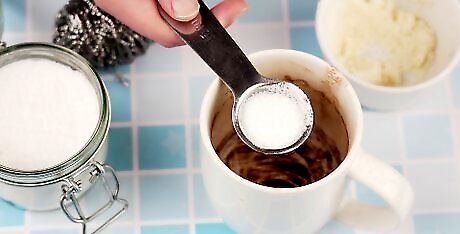
Squeeze a few drops of dish soap in a stained mug and add a big pinch of salt. You can use your fingers or a scrub brush to rub this mixture into the stains. Then, rinse it off with hot water and check your progress. Really stubborn stains might need another scrub! Don't forget to clean your coffee pot, too. You could use the dish soap and soap mixture or put 1 cup (150 g) of crushed ice into a room-temperature glass coffee pot. Add 2 teaspoons (9 g) of coarse salt and 1 tablespoon (15 ml) of water. Swirl the pot so the salt and ice scour the bottom. Then, dump it out and rinse it.
Lift water rings from wooden surfaces.
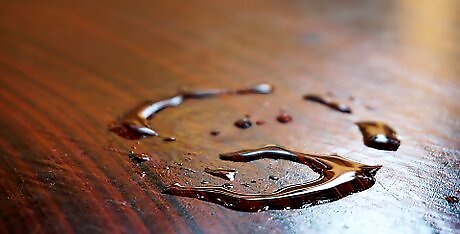
Rub a few drops of vegetable oil with a pinch of salt onto white water stains. You can a dry cloth or your fingers to rub this thin paste into the wood. Let the mixture sit on the stain for 10 minutes. Then, take a clean, dry cloth and wipe it off. This works best the sooner you catch the water stain.
Stop red wine from staining fabric or carpet.
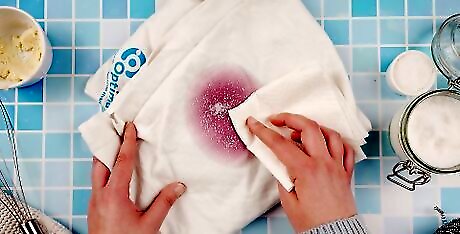
Dab the stain with a paper towel to absorb the spilled wine. Work fast and pour club soda onto the tablecloth or carpet. Then, sprinkle salt over the wet material. Don't be afraid to use a lot! The salt will bring up the stain so it's easier to clean. Wipe off the excess salt after a few minutes. Wash the tablecloth according to the care settings on its label or vacuum the carpet.
Lift bloodstains from clothes or tablecloths.
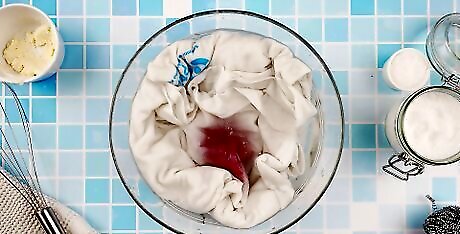
Soak your item in cold saltwater before you wash it in the machine. Fill your sink or a bowl with cold water and add about 2 tablespoons (34 g) of salt for every 4 cups (0.95 L) of water. Swish your hands in the sink to dissolve the salt. Then, put the stained clothes or tablecloth in it and soak it for 1 hour. Take your item out and throw it in the washing machine to completely remove the stain. Read the item's care label and wash it on the highest possible heat setting.
Eliminate sweat stains from your shirts.
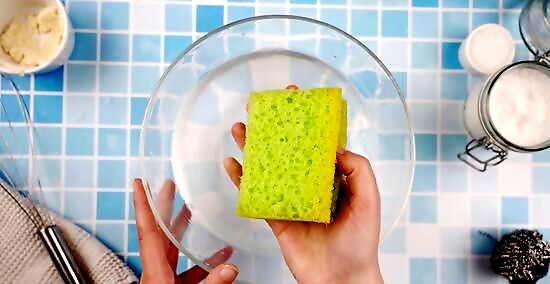
Mix 4 tablespoons (68 g) of salt in 1 US qt (0.95 L) of hot water until it dissolves. Take a sponge and dip it in the hot saltwater. Then, dab it on yellow sweat stains that have set on your clothes. Keep dipping and dabbing until you see the stains lift. Wash the clothes once the stain's out. This gets rid of the salt that's left in the fibers of the shirt.




















Comments
0 comment